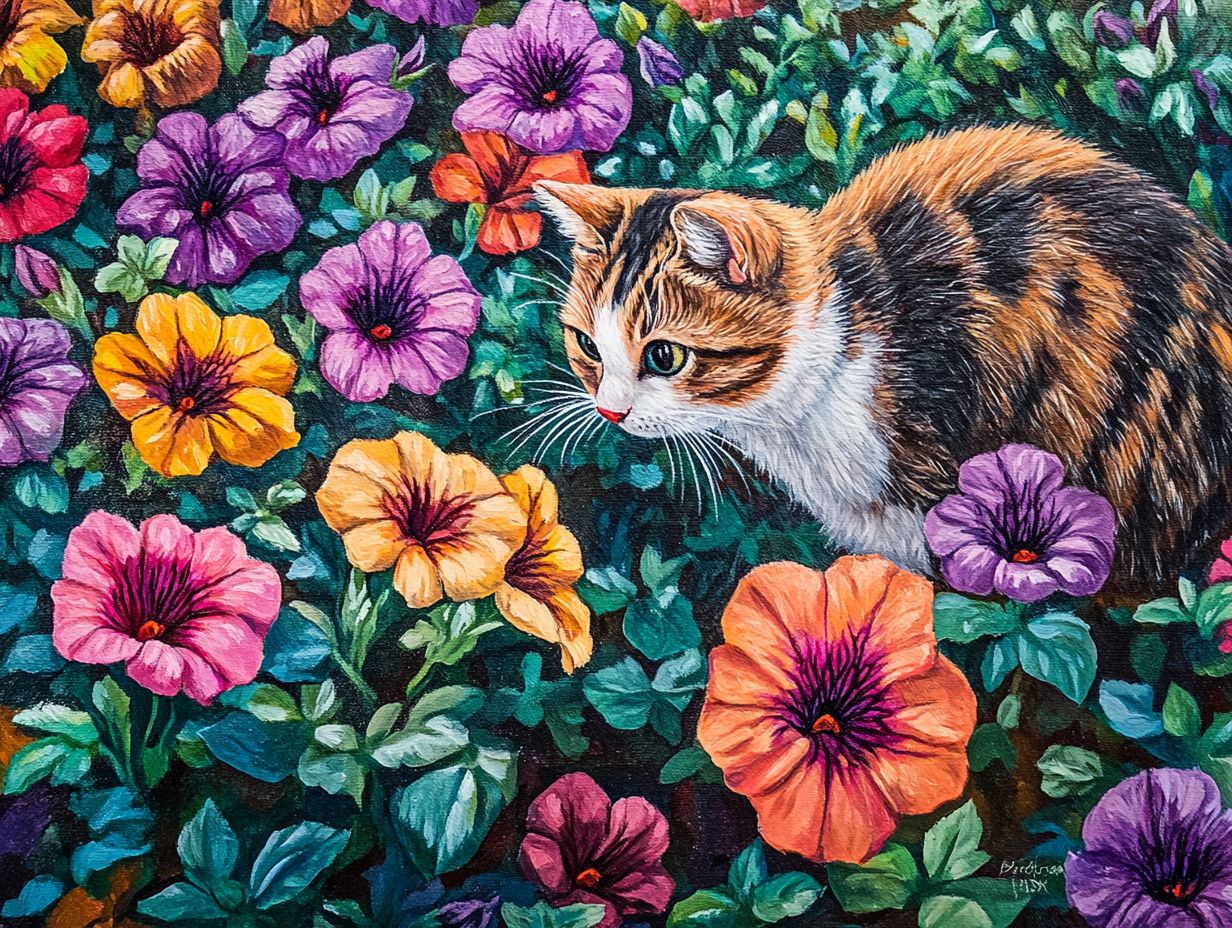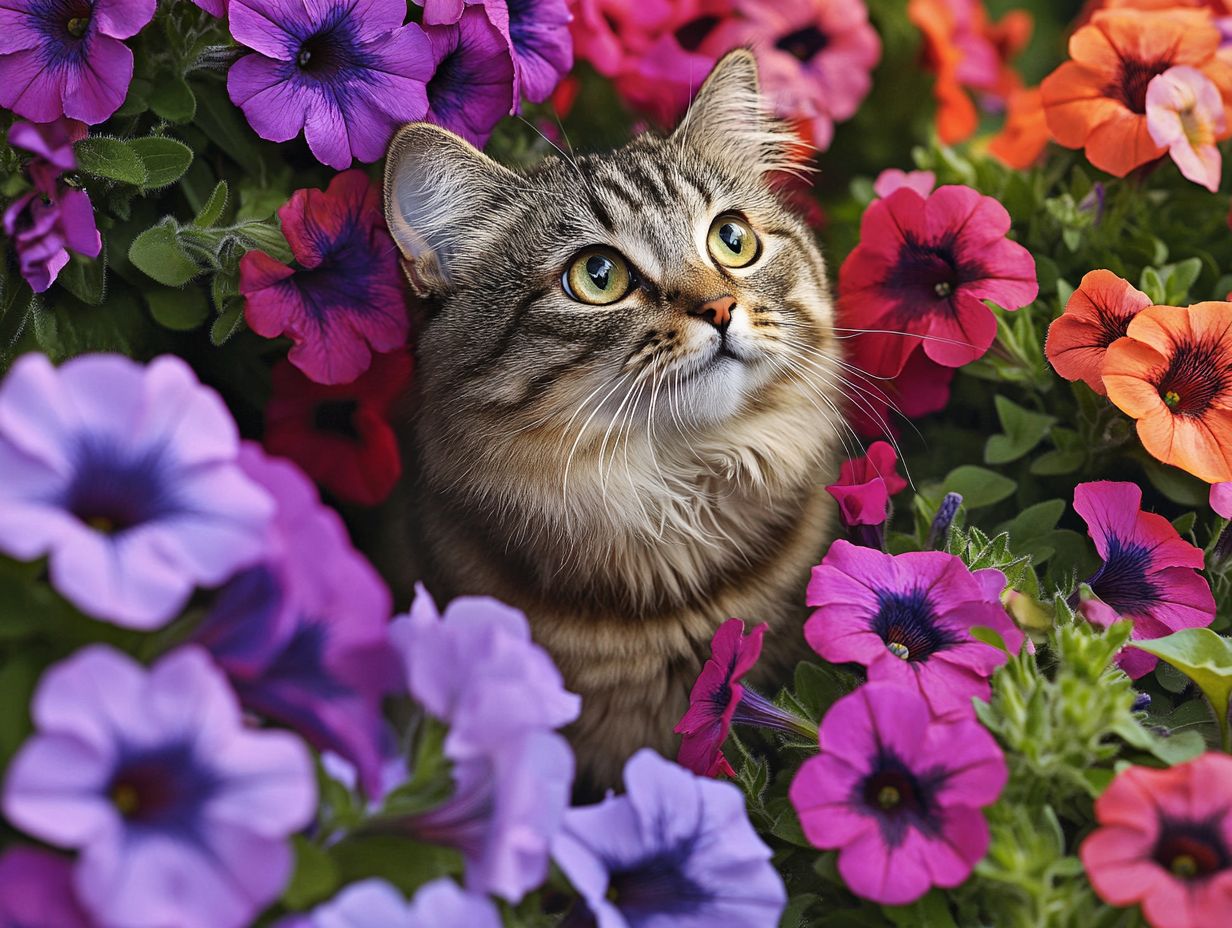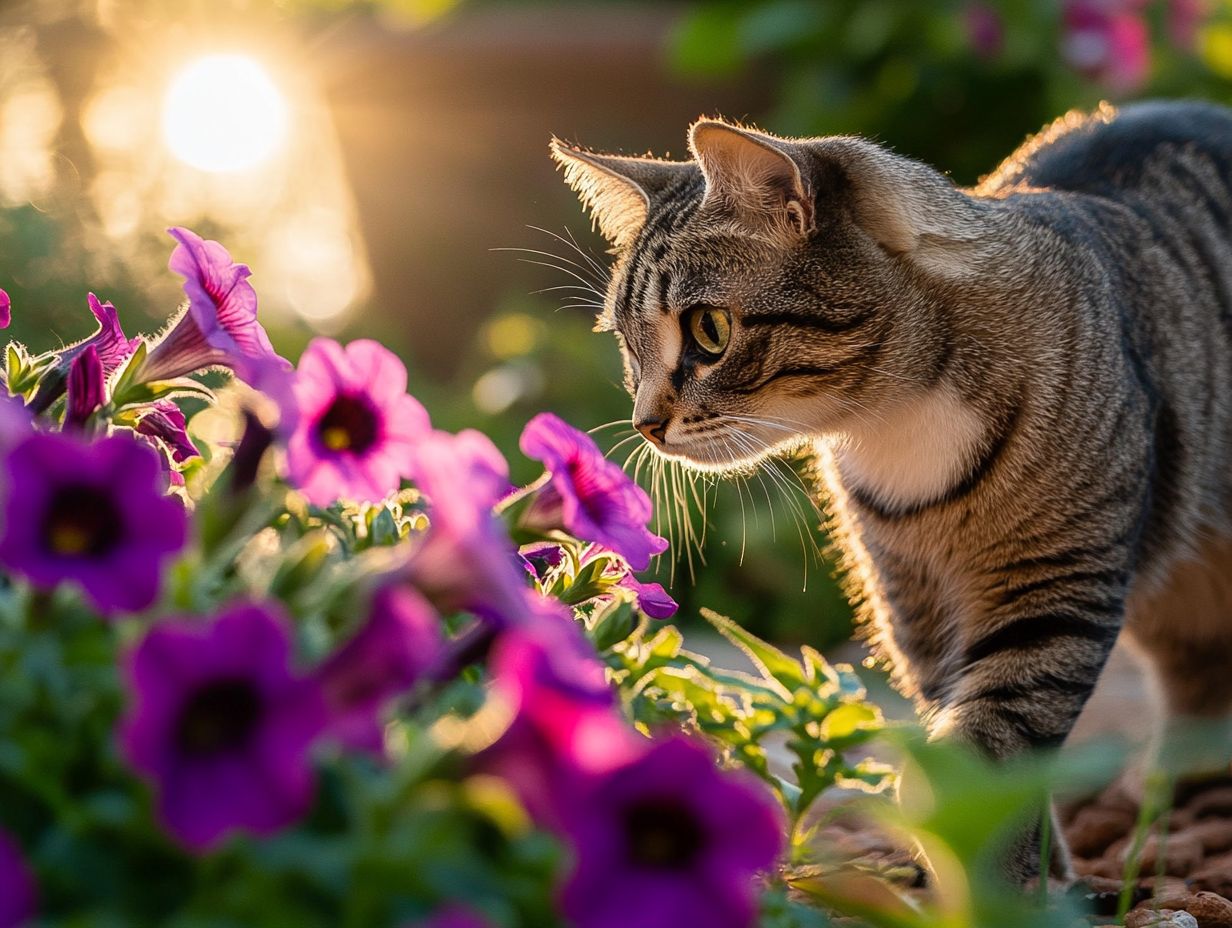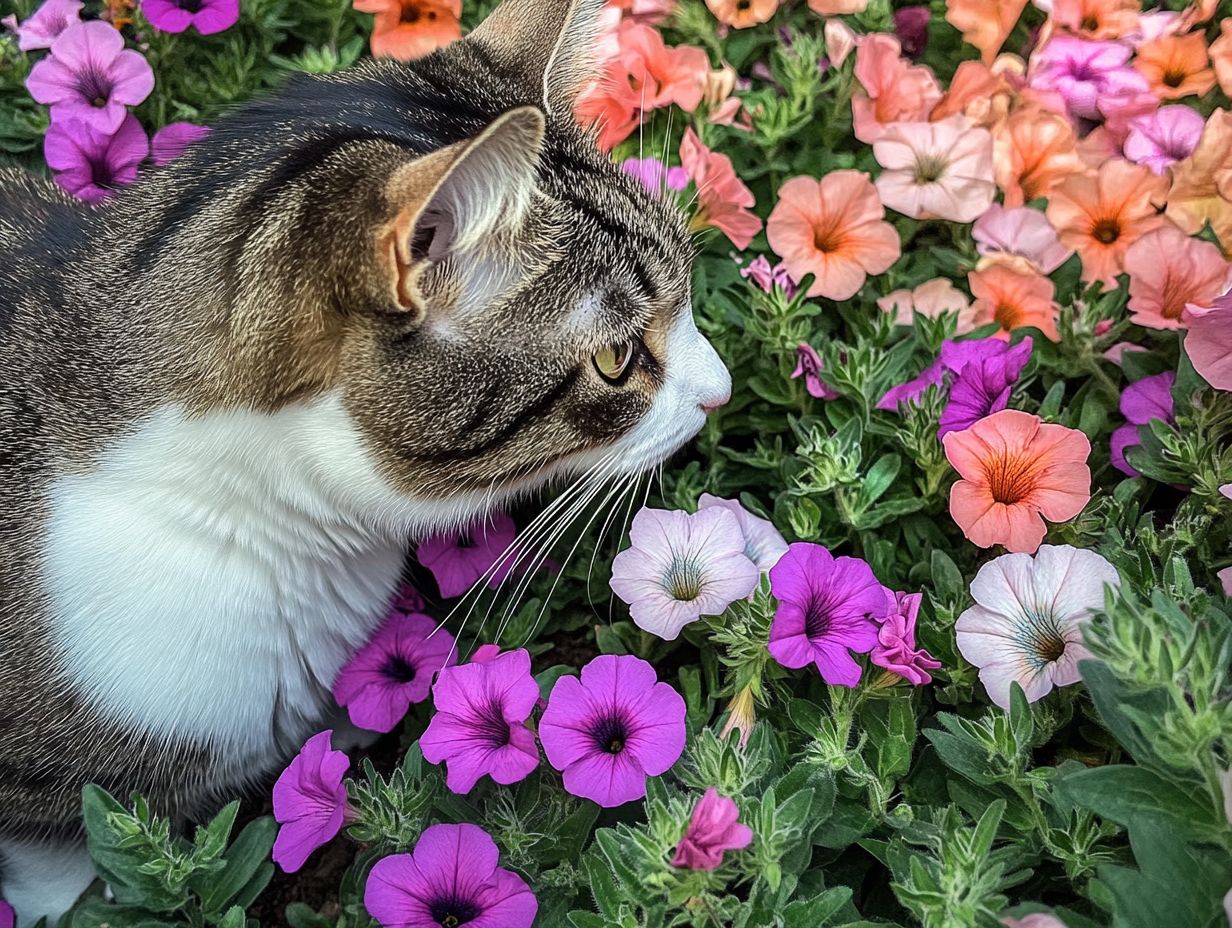As a pet owner, ensuring your furry friend’s safety and health is a top priority. Petunias are classified as non-toxic to cats, meaning they do not cause serious harm. However, it’s important to note that ingestion may cause mild irritation.
While petunias are popular garden favorites, you might wonder whether they pose a risk to your curious cat or if other flowering plants like lilies and daffodils might be more harmful. According to the ASPCA, petunias are generally considered non-toxic, yet caution is advised with other plants like lilies and Sago Palm.
This guide explores the toxicity of petunias, detailing the parts that could cause discomfort, the symptoms of ingestion, and what steps to take in case of a mishap, providing valuable guidance for pet owners.
Plus, tips are shared on keeping your cat safe while still enjoying beautiful blooms and other safe flowers and plants.
Key Takeaways:

Can Petunias Harm Your Cat?
According to the ASPCA, petunias are classified as non-toxic to cats. However, as a cat owner, it is essential to be aware of the dangers posed by many common garden and decorative plants, such as Sago Palm and lilies, that can be harmful to your feline friend.
This article provides important information about the toxicity of petunias and offers guidance on how to keep your curious cat safe while enjoying a beautiful garden or indoor space filled with seasonal flowers.
What Are Petunias?
Petunias are flowering plants renowned for their vibrant colors and adaptability to various garden styles, making them a popular choice for decorative purposes. These plants come in numerous flower types and can be cultivated both indoors and outdoors as part of seasonal displays, alongside other seasonal plants like African Violets and Easter Lilies.
Native to South America, petunias are often selected for their ability to thrive in a wide range of conditions, including full sun and partial shade. They prefer well-drained soil and require consistent watering to maintain their vibrant blooms, similar to other non-toxic flowers.
The extensive variety of colors, ranging from soft pastels to bright jewel tones, allows for creative combinations in landscaping and decorative containers. Petunias are frequently seen cascading from hanging baskets or window boxes, serving both as an aesthetic element and as a source of nectar for pollinators such as bees and hummingbirds.
Their low maintenance requirements make them an excellent choice for both novice and experienced gardeners, especially when considering safe options for households with cats.
How Do Petunias Affect Cats?
Understanding the health effects that petunias can have on cats is crucial for pet owners who wish to create a safe living environment for their furry companions. This includes being aware of other toxic plants like Sago Palm and philodendrons.
According to ASPCA standards, petunias are generally classified as non-toxic; however, it is wise for owners to monitor their cats for any unusual behavior or signs of gastrointestinal upset following exposure, as individual reactions can vary. It’s also important to seek advice from a veterinarian if needed.
Consulting with a veterinarian can help pet owners gain a better understanding of how various plants may affect their pets.
What Parts of Petunias are Irritants to Cats?

Petunias are not considered toxic to cats; however, it is essential to be aware of their potential risks and effects. While the flowers and leaves of the plant are safe, the roots may cause discomfort if ingested. Owners should also be cautious of other houseplants like cyclamen and philodendrons.
Symptoms of Exposure
- Mild: Slight gastrointestinal upset, such as a minor stomach ache.
- Moderate: Persistent vomiting or diarrhea.
- Severe: If your cat shows signs of severe distress or unusual behavior, seek immediate veterinary assistance.
First Aid Instructions
If you suspect that your cat has ingested parts of a petunia, take the following steps:
- Remove any remaining plant material from your cat’s vicinity.
- Observe your cat for any symptoms, such as vomiting or diarrhea.
- Contact your veterinarian or an emergency pet poison hotline for guidance on the next steps.
Common Misconceptions
Many pet owners worry that all flowering plants are dangerous. While some flowering plants, like lilies, are indeed toxic to cats, petunias are not. Understanding which plants are safe and which are not can help pet owners maintain a beautiful garden and a safe environment for their furry friends.
Special Considerations
Kittens or cats with existing health conditions may be more sensitive to any potential irritants. Exercise extra caution and consult your veterinarian for personalized advice regarding your specific pet’s health.
For further information and specific concerns, pet owners are encouraged to consult their veterinarian and can also contact the ASPCA Animal Poison Control for immediate assistance if they suspect poisoning.
Disclaimer: The information provided in this article is for educational purposes only and is not a substitute for professional veterinary advice.
It is important to regularly review this content for accuracy based on the latest research. Last reviewed: [insert date].
Petunias are considered non-toxic to cats, but can cause mild gastrointestinal upset. The primary concern is that if a cat consumes any part of the plant, the fibrous material can lead to gastrointestinal distress. Ingesting large amounts of any plant material, even from non-toxic species, may result in gastrointestinal upset, which can manifest as vomiting or diarrhea. The implications of such consumption can be serious, potentially leading to dehydration or other severe medical conditions requiring professional veterinary intervention.
Therefore, it is crucial for cat owners to closely monitor their pets, especially in homes where petunias are present. Ensuring that pets do not have access to the plant can help prevent any issues related to accidental consumption. Using safe deterrents and distractions like cat grass can also be effective.
What Are the Symptoms of Petunia Toxicity in Cats?
- Mild symptoms: slight vomiting or lethargy
- Moderate symptoms: severe vomiting, dehydration
- Severe symptoms: loss of appetite, shock
The symptoms of petunia toxicity in cats can resemble those of poisoning from various other plants such as lilies and sago palm, including vomiting, diarrhea, and other signs of gastrointestinal upset. While the symptoms of petunia toxicity are not extensively documented, the American Society for the Prevention of Cruelty to Animals indicates that petunias are not considered highly toxic to pets. In addition to gastrointestinal issues, changes in behavior such as lethargy, excessive drooling, and signs of distress—like vocalization and restlessness—may also occur.
Pet owners should monitor their cat’s condition closely, as symptoms can worsen rapidly and lead to more severe health problems. Symptoms may include nibbling or chewing on petunias, and it is important to consult a veterinarian if any concerning signs arise. Always prioritize professional medical advice in such situations.
Veterinary intervention can often enhance the prognosis for pets displaying symptoms of plant toxicity.
What Should You Do If Your Cat Ingests Petunias?
If you suspect that your cat has eaten petunias, take the following steps:
- Monitor your cat closely for any signs of poisoning, such as vomiting or lethargy. Symptoms of poisoning might also include digestive upset.
- If you notice any of these symptoms, seek veterinary care immediately and follow the vet’s guidance.
- If your cat shows signs of distress, keep them calm and contact your veterinarian immediately.
How to Induce Vomiting in Cats?
Veterinarians generally advise against inducing vomiting in cats, except in very specific circumstances, as doing so improperly can be harmful. If your cat has ingested petunias or any other plant, it’s essential to consult your veterinarian for guidance on the best next steps. This is especially important if the plant ingested is known to be highly toxic, such as sago palm or philodendrons.
In many cases, the veterinarian may recommend inducing vomiting; however, there are instances where this may not be the best option. For example, if your cat has consumed a caustic substance, inducing vomiting could do more harm than good. The veterinarian will provide specific instructions on whether to induce vomiting, and this should always be done under their guidance and supervision.
For certain toxins or plant materials, the veterinarian may suggest administering activated charcoal as a safer alternative. You can aid the veterinarian’s assessment by monitoring your cat’s behavior and noting any symptoms, such as lethargy or gastrointestinal distress. Remember, always seek professional guidance when dealing with potential poisoning.
Additionally, maintaining a list of toxic plants and substances to remove from your home can help prevent future incidents. Always prioritize your pet’s safety and well-being by seeking professional medical assistance if you are unsure.
Common Misconceptions
Many believe that petunias are highly toxic to cats, but as noted by the ASPCA, they are actually considered non-toxic.
Special Considerations
Particular risks may apply to kittens and older cats, who may be more susceptible to the effects of any plant material.
When to Seek Veterinary Care?

Knowing when to seek veterinary care is crucial for cat owners who suspect their cats may have ingested petunias. If your cat exhibits unusual symptoms such as vomiting, weakness, or digestive upset, it is important to consult a veterinarian immediately for timely treatment and intervention. Monitoring for symptoms of poisoning is key for the well-being of your pet.
Urgent veterinary care may be necessary for cats showing signs such as diarrhea, excessive drooling, or a sudden loss of appetite. Cat owners should be vigilant about these symptoms, as early intervention can significantly improve outcomes.
Emergency Contact Information
For immediate assistance, contact the ASPCA Animal Poison Control at (888) 426-4435.
Disclaimer: The information provided in this article is for informational purposes only and does not substitute for professional veterinary advice. Always seek the guidance of your veterinarian with any questions you may have regarding your pet’s health.
This article was last reviewed on [insert date] and will be updated as new research becomes available.
Additionally, if your cat is behaving unusually—such as hiding more than usual or showing distress when handled—these behavioral changes may indicate underlying health issues. Being aware of these warning signs can help ensure that your pet receives the appropriate evaluation and treatment as soon as possible. Regular check-ups with a vet can provide preventative care and guidance.
How to Prevent Petunia Toxicity in Cats?
Preventing petunia toxicity in cats is the responsibility of pet owners. They should create a safe environment by keeping harmful plants out of reach and selecting non-toxic flowers and plants for both indoor and outdoor spaces that are safe for felines. Examples include catnip, spider plants, and Christmas cacti.
Are Petunias Toxic to Cats?
Petunias are generally considered mildly toxic to cats. The parts of the plant that can be harmful include the leaves and flowers. Known toxic compounds include solanine, which can lead to adverse effects if ingested.
What Are Safe Alternatives to Petunias for Cats?
When seeking safe alternatives to petunias for cat owners, it’s essential to choose non-toxic flowers and plants that enhance your indoor or outdoor space. Examples of such safe alternatives include catnip, African violets, and other cat-safe plants that won’t harm cats who enjoy nibbling on foliage, such as spider plants and Christmas cacti.
These plants not only add vibrant beauty and color to your garden or home but also provide natural sources of enjoyment for pets. Catnip can serve as an engaging toy for cats, while African violets showcase stunning flowers. Additionally, spider plants and Christmas cacti are both pet-safe options that require minimal maintenance.
Symptoms of Petunia Poisoning
Symptoms of petunia poisoning can be categorized as follows:
- Mild: Vomiting, slight lethargy.
- Moderate: Diarrhea, loss of appetite, excessive drooling.
- Severe: Difficulty breathing, seizures, or unconsciousness.
Always monitor your cat’s health closely and seek guidance from a vet if you observe any symptoms.
How to Keep Your Cat Away from Petunias?
To keep your cat away from petunias, it’s essential to plan carefully and maintain a watchful eye to prevent exposure to these flowers, which can be harmful if ingested.
Employing barriers, alternative plants, distractions, and safe deterrents can effectively protect your pet. Planting non-toxic alternatives, such as cat grass or catnip, nearby can provide a safe distraction for cats, steering them away from the petunias. Additionally, regular monitoring can prevent potential issues.
Regular observation is also important; if you notice your cat spending too much time near the flowers, you can intervene accordingly.
Gentle deterrents can be employed as well; for instance, placing citrus peels around the petunias can help, as cats typically dislike the smell of citrus. This method is a safe way to curb their curiosity without causing any harm to the animals. Make sure to use pet-friendly deterrents and consult with a vet for additional advice.
First Aid for Suspected Petunia Poisoning
If you suspect your cat has ingested petunias:
- Contact a veterinarian immediately.
- Do not induce vomiting without veterinary guidance.
- Be prepared to provide information about the plant ingested and the symptoms observed.
Potential treatments may include supportive care, medications to manage symptoms, or detoxification procedures.
Frequently Asked Questions

Can petunias or other flowers harm my cat?
Yes, certain varieties of petunias can be toxic to cats if ingested. Other plants, like lilies and daffodils, are also poisonous to cats.
What are the symptoms of petunia poisoning or other plant-related issues in cats?
Symptoms of poisoning may include vomiting, diarrhea, lethargy, loss of appetite, and difficulty breathing. Always monitor your cat’s health closely and seek guidance from a vet.
Are all petunias or similar decorative plants toxic to cats?
No, not all petunias are toxic to cats. Some varieties, such as the “Millifiori” series, are safe for cats. It’s important to know which are non-toxic and safe plants for your feline-friendly home.
Can my cat still be affected by petunias or other plants if they don’t eat them?
Yes, cats can still experience irritation or allergic reactions from coming into contact with petunias, such as through their fur or skin. This is similar to other houseplants like philodendrons and cyclamen.
What advice should I follow if my cat has ingested petunias or other toxic plants?
If you suspect your cat has ingested petunias, seek immediate veterinary care. Do not induce vomiting without consulting a veterinarian first. The ASPCA provides valuable guidance on such matters.
How can I keep my cat safe from petunias and other toxic plants?
If you have petunias in your home or garden, make sure they are placed in areas that are inaccessible to your cat. Consider safe flowers like African Violets or cat grass for your indoor or outdoor garden. Regularly monitor your curious nibbler’s behavior and remove any wilting or chewed petunias immediately.
For more information on plant toxicity, consult the ASPCA Animal Poison Control.